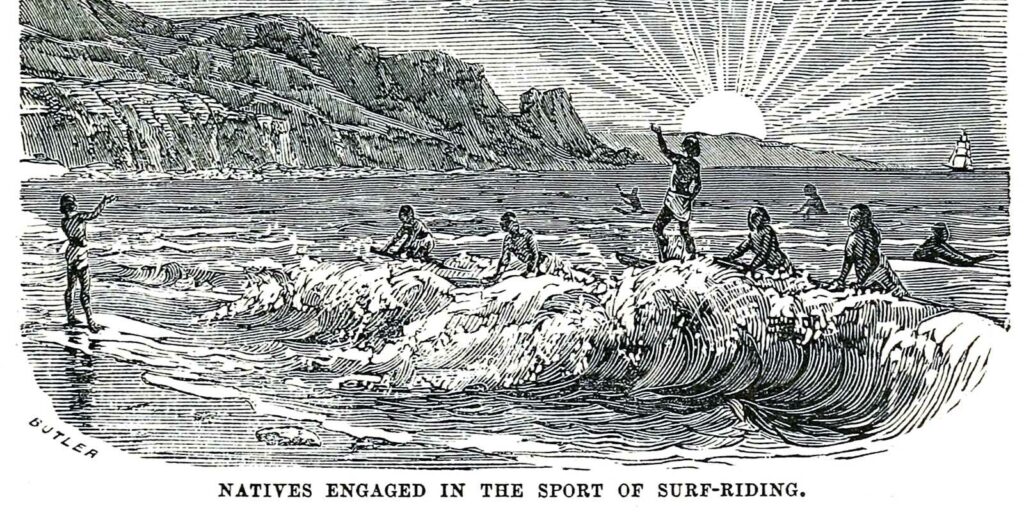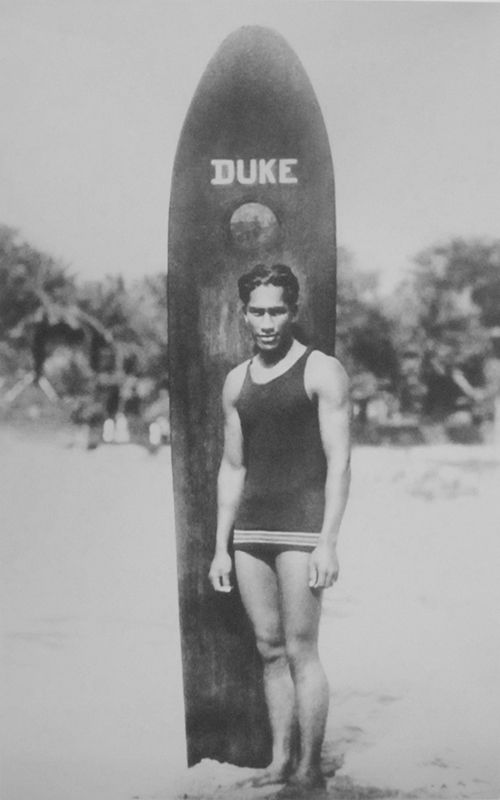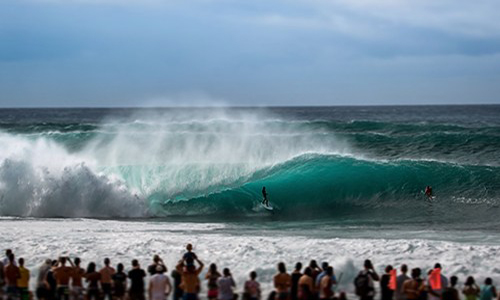Culture, history and future intersect to create the perfect wave
Surf studies may just well be the new wave in some academia circles. As more scholars publish academic books about the sport of surfing, from “Waves of Resistance: Surfing and History in Twentieth-Century Hawaiʻi” to “Waves of Knowing: A Seascape Epistemology,” universities around the world have begun to embrace the discipline as worthy of research, education and scholarship.
A decade ago, a love for surfing prompted a group of Chaminade faculty members, including Drs. Jim Kraus, Pete Steiger, Michio Yamasaki and Hank Trapido-Rosenthal, to brainstorm the idea of teaching an undergraduate surf class. Yet, it wasn’t until a few years ago, during a casual faculty pau hana, that the notion of “Critical Surf Studies” re-emerged.
“I mentioned it to Lynn (President Babington) and she was interested,” recalls Kraus, an avid surfer since the ’60s and the former publisher of “Hawai‘i Surf & Sea;” from 1980-1984. “Then Lance (Provost) walked by, and I pitched the idea to him, too.”
Eventually, it was Cheryl Edelson, Ph.D., Dean of School of Humanities, Arts, and Design, who presented the topic to the full Chaminade Curriculum Council, which is the final recommending voice in curricular matters with the definitive stamps of approval resting with Drs. Babington and Askildson.

“Surfing is such an integral part of Hawaiian culture that it deserves to be part of our curriculum,” Babington says. “This program is the first of its kind in Hawai‘i, and it challenges students to explore surf culture’s indigenous origins, its growing popularity globally and its importance to Hawai‘i’s sense of place.”

Celebrating its second anniversary, the Surf Studies Minor examines the broad area of surfing communities and the complicated conflicts that define them, conflicts over access—to beaches, to parking and to the surf zone (po‘ina nalu) itself. Also of central concern is “ownership” of individual waves. It’s a question that Kraus posed in his first class of the semester.
“The idea behind wave ownership and the entitlement that accompanies the belief that one could own any wave signifies a pretty strong misunderstanding of the relationship between surfers and the wave,” Environmental Studies major, Kahana Yokoyama ’23, posted to the class’s online forum. “A good example is merging while driving. If two lanes combine, regardless of where, there is a relatively similar degree of respect when leaving room for others to merge. Taking turns is the most basic basis for this and the same is true for surfing.”
The SURF 480 class uses an asynchronous-learning model, which does not require consistent real-time interactions with an instructor. Students can access course materials—lectures, readings and assignments—on their own time. Although this is an online class, students are required to regularly participate by posting responses to questions posed on the forum. And they must also keep a journal in a conventional bound paper notebook, which they will have to submit regularly, and which Kraus says he reserves the right to read.
“We examine surfing in an academic sense and as part of pop culture,” Kraus explains. “We look at surfing from three perspectives: as a spectator watching surfers from the beach, in the movies and online; as a participant who enters the water and finds a way to the po’ina nalu; and as a literalist, someone who watches weather reports and predicts the surf, promotes surfing, or designs surf boards or clothing.”
According to Kraus, by the end of the term, students should be able to 1) define key terminology used in the interpretation and analysis of surf culture; 2) articulate the relationship between surfing communities and coastal ecosystems; and 3) report on what is of personal, ethical or religious significance in surfing and surf studies by applying Marianist values related to “Education in Family Spirit.”
“This class accentuates my environmental studies, and gives context to the Hawaiian culture and what we read about in texts,” says Yokoyama, who already has a job lined up as an environmental consultant with a Kailua firm. “It teaches you how to apply what you’re learning about surfing to reef health, and how coastal eco-systems interact with surfing as a sport and an industry.”

While Chaminade students are able to minor in Surf Studies, other universities now offer fully-fledged bachelor’s degrees in surfing, while a few schools even enroll students in post-graduate programs that focus on surfing.
Dr. Gail Grabowsky, Dean of the School of Natural Sciences & Mathematics and Executive Director U.N. CIFAL Honolulu, believes that there’s a lot of activity related to getting on a board and riding the waves. “Many of the Environmental Studies students love the ocean, and are also very conscious of issues like marine debris and materialism,” says Grabowsky. “There are also some wonderful service opportunities with charitable organizations that really look after the ocean, such as the Surfrider Foundation, which has raised awareness and kept wonderful data.”
Askildson has developed a deep connection with surfing since he first learned the art of riding waves off the shores of Daytona Beach in Florida 25 years ago. His affinity towards the surf has grown even deeper since first moving to Australia and now to Hawai‘i.
“I found the Surf Studies program compelling because it is as much about the history of the Hawaiian culture as it is about the history of surfing,” Askildson asserts. “At Chaminade, we serve the people of Hawai‘i and celebrate the culture that makes our islands both unique and special; this program is a striking articulation of that mission and legacy.”



